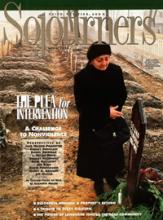Fasten your seat belts! We are in for some sharp turns in the road. A donkey ride of hope and hosannas leads to the tomb of total despair. The tomb of weeping leads to the laughter of new life. The darkened house of doubt opens to the light of a peace you can touch. The dusty road of disappointment reveals the surprise of resurrection. Yesterday's tragedy does not rule God's tomorrow. It's resurrection time. When hurt meets up with hope, we keep finding God. Christ is risen! Thanks be to God!
April 4, Palm Sunday: Show and Tell
Isaiah 50:4-9a, Philippians 2:5-11, Matthew 21:1-11, Psalm 118:19-29
I was once described as "a good preacher, though dramatic." I wonder if Jesus ever received such a description? After his palm parade into Jerusalem, he certainly deserved it. For the demonstration march into Jerusalem, Jesus requested a donkey to ride. Preacher Jesus assumed that everyone would quickly catch on to his show-and-tell lesson on servanthood.
Zechariah 9:9 speaks of God who is coming not only as "humble and riding on a donkey," but as "triumphant and victorious" as the oppressors are forced out of power. The crowd that gathered for the demonstration wanted to have their occupied country set free of Roman rule. The donkey was a beast of burden. Jesus' ride symbolically trampled not only the Roman rule, but the privilege of the high priesthood who collaborated with the foreign occupation. Jesus dramatized the hope that Israel would be a servant people, with neither Roman or Hebrew imperialism.
Read the Full Article

